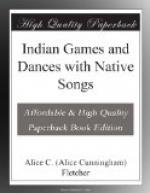II
PLUM STONE GAME
This game belongs to the second and non-ceremonial class of the games of hazard and is generally played by women. The Omaha type is here given, but it is similar to the game as played by kindred tribes.
Properties.—Five plum stones; a basket or wooden bowl; one hundred counters. The Omaha used stalks of the blue joint grass as counters, but small twigs or sticks will serve.
The plum stones should be carefully cleaned and dried. Two of the stones are burned black on both sides with a hot iron; on one side of each of these stones a crescent is marked, and between the lines of the figure the black is carefully scraped so as to leave a clear design of a new moon on a background of black. On the other side of these two stones a star, four or five pointed, is drawn and all the black within the lines is scraped off, leaving a brown star on a background of black. The other three stones are each burned black all over on one side; the other side is left the natural color of the stones. These stones can be prepared in camp, but the basket or wooden bowl will probably have to be furnished from outside.
Directions.—Two players to one basket or bowl. The game is generally one hundred points.
The two players sit opposite and have the basket or bowl between them, with the five plum stones lying in the bottom. The one hundred counters are within reach at one side. As points are made, the winner takes a corresponding number of counters from the general pile and lays them beside her on the side opposite to the general pile; when this is exhausted, then the winner takes her counters from the winnings of her opponent. Whoever wins all of the one hundred points has the game.
Lots should be drawn to decide who shall have the first play. The one who wins the first play takes the bowl or basket by the rim with both hands and gives it a toss sufficient to throw up all the stones, but not violent enough to make them fall outside the bowl or basket; such a throw would not count. If the throw is not such as to move all the stones, make them turn and all move about within the bowl, that throw will not count.
The following are the combinations that count, that is, make points:
Two moons and three whites (natural color) = 10 points.
Two stars and three blacks = 10 points.
One moon, one star and three whites (natural color) = 1 point.
One moon, one star and three blacks = 1 point.
No other combinations count anything in the game. As will be seen, there are a number which cannot be counted. If one tosses the bowl and the stones fall in such manner as to make a combination that does not count, there is no forfeit; the player merely fails to score any points. The player who wins a point, or points, keeps on tossing the bowl until she fails to make a point. She must then let her opponent toss the bowl, who will keep tossing the bowl as long as she can win a point. There are players among the Indian women who are very skilful and are able to make the stones fall frequently in the combinations that win ten points.




